
William Wyndham Grenville, 1st Baron Grenville, was a British Pittite Tory politician who served as Prime Minister of the United Kingdom from 1806 to 1807, but was a supporter of the Whigs for the duration of the Napoleonic Wars. As prime minister, his most significant achievement was the abolition of the slave trade in 1807. However, his government failed to either make peace with France or to accomplish Catholic emancipation and it was dismissed in the same year.
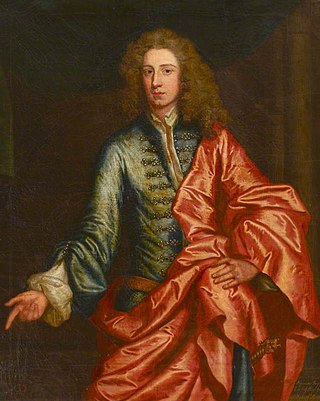
General Algernon Seymour, 7th Duke of Somerset was a British Army officer, Whig politician and peer who sat in the House of Commons from 1708 to 1722 when he was raised to the peerage as Baron Percy and took his seat in the House of Lords.
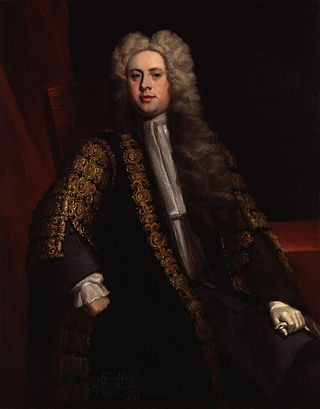
Sir William Wyndham, 3rd Baronet, of Orchard Wyndham in Somerset, was an English Tory politician who sat in the House of Commons from 1710 to 1740. He served as Secretary at War in 1712 and Chancellor of the Exchequer in 1713 during the reign of the last Stuart monarch, Queen Anne (1702–1714). He was a Jacobite leader firmly opposed to the Hanoverian succession and was leader of the Tory opposition in the House of Commons during the reign of King George I (1714–1727) and during the early years of King George II (1727–1760).
Robert Montagu, 3rd Earl of Manchester JP was an English courtier and politician who sat in the House of Commons from 1660 to 1671 when he inherited the peerage as Earl of Manchester.

Edwin Richard Wyndham-Quin, 3rd Earl of Dunraven and Mount-EarlKP PC was an Irish peer, Member of Parliament, and archaeologist.

Windham Henry Quin, 2nd Earl of Dunraven and Mount-Earl was an Irish Peer.

Sir William Wyndham, 1st Baronet of Orchard Wyndham, Somerset, was Member of Parliament for Somerset in 1656 and twice for Taunton in 1659 and 1660. He was Sheriff of Somerset in 1679–80.
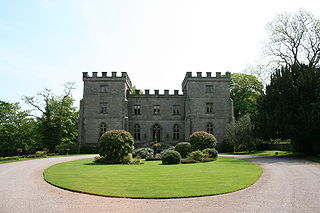
Clearwell Castle in Clearwell, the Forest of Dean, Gloucestershire, is a Gothic Revival house constructed from 1727. Built by Thomas Wyndham to the designs of Roger Morris, it is the earliest Georgian Gothic Revival castle in England predating better-known examples such as Strawberry Hill House by over twenty years. A home of the Wyndham family for some 150 years, the first half of the twentieth century saw a disastrous fire, and subsequent asset-stripping, which brought the castle close to ruination. Slowly restored from 1954, in the 1970s the castle housed a recording studio used by, among other major bands, Black Sabbath, Led Zeppelin, Deep Purple, Bad Company, Queen and Sweet. Now operating as a wedding venue, the castle is a Grade II* listed building.
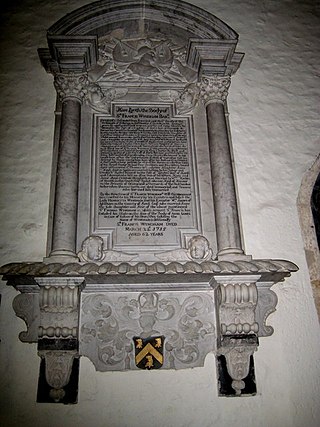
Sir Francis Wyndham, 1st Baronet of Trent, Dorset was an English soldier and politician who sat in the House of Commons of England at various times from 1640 until his death in 1676. During the First English Civil War, he served as a colonel in the Royalist army and helped Charles II of England escape to France after his defeat in the 1651 Third English Civil War.
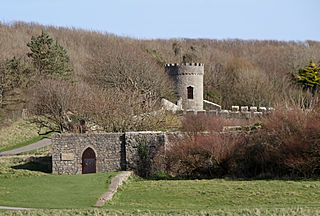
Dunraven Castle was a mansion on the South Wales coast near Southerndown. The existing manor house was rebuilt as a castellated hunting lodge in the early 19th century and was extensively remodelled later in the century. The surviving parts of the house are a Grade II listed building and its gardens and park are designated Grade II on the Cadw/ICOMOS Register of Parks and Gardens of Special Historic Interest in Wales.

Edward Phelips was an English landowner and politician who sat in the House of Commons at various times between 1640 and 1679. He fought for the Royalist cause in the English Civil War.
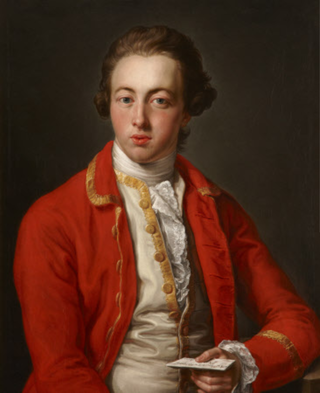
Sir John Parnell, 2nd Baronet was an Anglo-Irish Member of Parliament.
Thomas Wyndham, was a Welsh politician.
Charles Edwin was a Welsh politician who sat in the House of Commons from 1741 to 1756.

Samuel Edwin, of Llanmihangel Plas, Glamorgan, was an English politician who sat in the House of Commons briefly in 1717.
Thomas Hoby JP DL of Bisham Abbey, Berkshire and Breamore, Hampshire, was an English politician.
Sir Charles Wyndham was an English politician who served as a Whig Member of Parliament from 1679 to 1701.
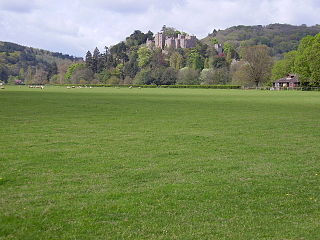
The feudal barony of Dunster was an English feudal barony with its caput at Dunster Castle in Somerset. During the reign of King Henry I (1100–1135) the barony comprised forty knight's fees and was later enlarged. In about 1150 the manors retained in demesne were Dunster, Minehead, Cutcombe, Kilton and Carhampton in Somerset, and Ham in Dorset.

Thomas Wyndham of Clearwell Court, Gloucestershire, Dunraven Castle, Glamorgan, and Cromer, Norfolk, was a British lawyer and politician who sat in the House of Commons from 1721 to 1734.

The title Baron Cobham has been created numerous times in the Peerage of England; often multiple creations have been extant simultaneously, especially in the fourteenth century.














